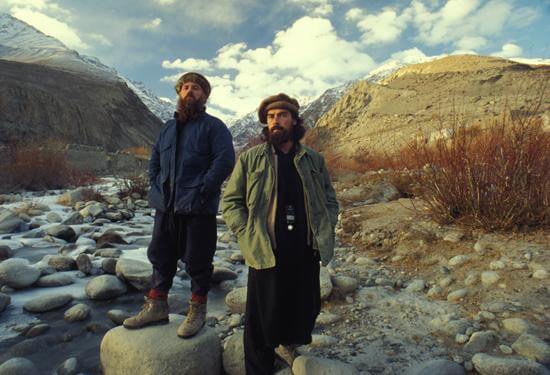By April Isaacs
Until recently, I was a travel editor at a major guidebook publisher. The job required heavy text−editing, and contrary to what the title suggests, no travel. What made the job unbearable was that it took something I loved — travel — and made me hate it. I’d edit hundreds of pages of the same boilerplate prose: a well−appointed hotel room here, a vibrant market there, with “jaw−dropping” and “mind−blowing” profundities all over the place. Only the locales would change.
After all, this was tourism, not travel, and no matter how badly the travel industry would like tourists to believe that they’re swashbuckling and trailblazing when they ride a camel to Petra or trip out on ayahuasca root with a Peruvian shaman, they’re not. They’re following — and paying dearly for — a well−trod, exploited path, arranged to a T by professional tour agencies for what would seem an authentic travel experience.
In order to be authentic, however, an experience requires emotional preparedness, resources, and often, physical endurance, luxuries the average full−time worker with two weeks of vacation a year usually can’t afford, but something I’d come to see counterfeited by numerous would−be Indiana Jones guidebook authors and travel−show hosts.
But Denis Belliveau and Francis O’Donnell didn’t use any tour agency to plan their trip tracing the path of Marco Polo from Venice to China and back. Imagine, two Americans — two guys from Queens — standing outside a mujahedeen compound during Afghanistan’s warlord period in the mid−’90s. They weren’t military or CIA. They were just a couple of regular guys on a trip following their only guidebook, “The Travels of Marco Polo,” the Venetian explorer’s famous 13th−century travelogue, with the barrel of an AK−47 trained on the back of their heads, armed only with a letter of introduction from the brother of the faction’s warlord, asking him to help the travelers in whatever way he could. Talk about a connection.
O’Donnell and Belliveau said they were the first, and so far only, modern adventurers to follow Marco Polo’s entire route. A few people had tried it and failed, encountering impenetrable bureaucracy or political strife that forced them to abort mid− or early−trip. Belliveau and O’Donnell spent a year preparing for the trip and made a pact with one another — that they would only return to the United States in one of two ways: successful or dead.
The pair logged more than 100 hours of footage of their adventures, which included an ambush in Afghanistan, an anti−American demonstration in Iran and a trip through the off−limits Desert of Lop, where the Chinese conduct nuclear testing. The documentary of their arduous journey, “In the Footsteps of Marco Polo,” premiered Sunday on WLIW21, and is available online and in several encore broadcasts over the coming month.
O’Donnell, who is from College Point, and Belliveau, who hails from Douglaston, met on an archeological dig in France and became fast friends and travel companions. “We spent about 15 years before the [Marco Polo] trip traveling close to the ground, building our skills,” O’Donnell said in an interview.
He got the idea for the trip from a map of Marco Polo’s route that his mother gave him. It would take two years to complete the trip, from March 1993 to March 1995, and more than a year of preparation beforehand, obtaining visas, finding sponsors and making contacts. Living in Queens had given them a leg up, they said: Given the borough’s diverse population, it wasn’t hard to meet people from the countries they would visit who could give them contacts and advice.
The film goes beyond a flashy travel special — it’s part historical documentary, but also captures moments in recent history before the American invasion of Iraq and Afghanistan. “Without a doubt, it’d be easier to do this trip now,” O’Donnell said.
“[Afghanistan’s] in the paper, people know about it, you can get visas, it’s not as dangerous as it was when we were there,” Belliveau added.
“Denis and I did the Marco Polo journey out of sheer passion and tenaciousness,” O’Donnell said. The travelers certainly had remarkable determination, spending weeks and sometimes months waiting for entry visas; traveling by camel across endless, unchanging deserts that could easily drive someone insane; and fearlessly standing up to Chinese police officers who ordered them off a bus.
They became involved with the countries on Polo’s route on an intimate level, befriending locals who were eager to help them in their quest. What’s more, Belliveau and O’Donnell found most of Marco Polo’s cultural descriptions to be accurate, even some 700 years later. At one point, while in Mongolia, they witnessed a particular tribe gutting a sheep in exactly the way Polo had described it.
“There’s a lot more good people on the planet than bad,” Belliveau said in the film about what they’d taken away from their journey.
When people travel, it’s experience they’re after — a good story about their life, involving personal development, worldly insight and a visceral connection to the human plight. “Travel is the enemy of bigotry,” O’Donnell says in the film. And perhaps that’s the key — real travel is to understand people not just by eating their food or buying their souvenirs, but by following their footsteps.
“The Footsteps Of Marco Polo” premiered Sunday, Nov. 16, at 9 p.m. on WLIW21.
An encore presentation airs Thursday, Nov. 27, at 9 p.m. on WLIW21, and the film premieres Wednesday, Dec. 10, at 8 p.m. on Thirteen.
The documentary can also be streamed in full on the official site, www.wliw.orgâ„marcopolo — which also features exclusive video, production diaries, a timeline and more. The companion book can also be ordered at this site.
Denis Belliveau and Francis O’Donnell’s book, “In the Footsteps of Marco Polo,” can be purchased at most bookstores or from their Web site, www.returntovenice.com.




































